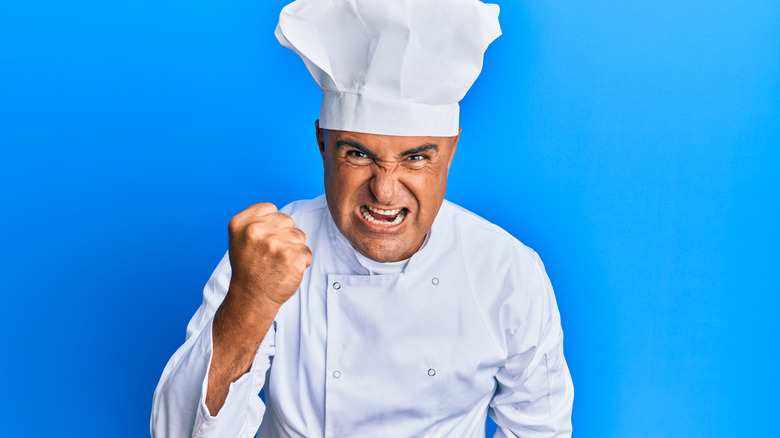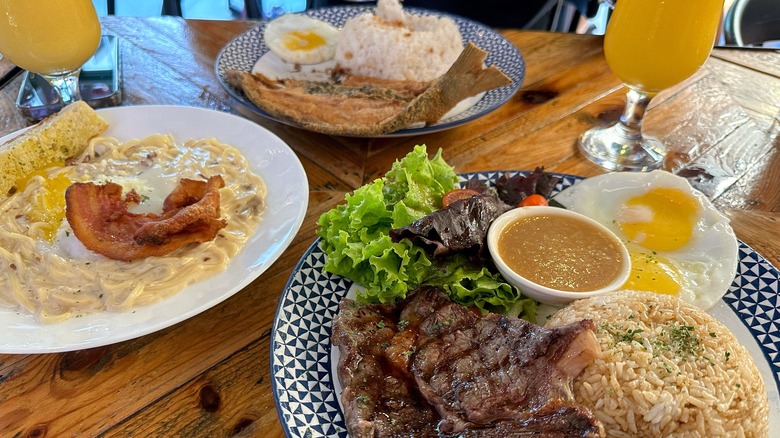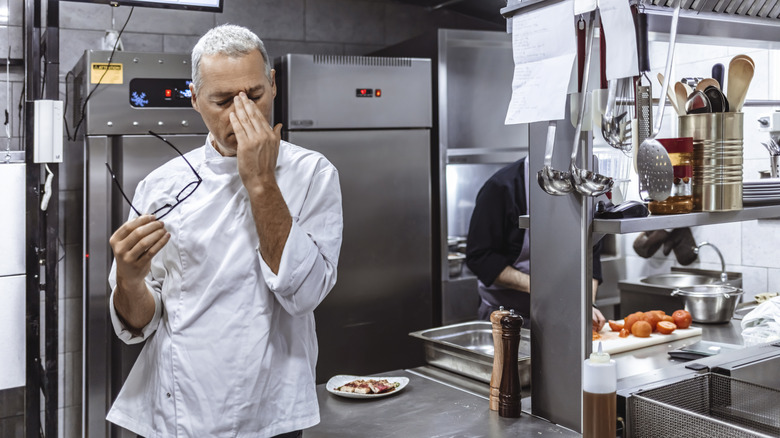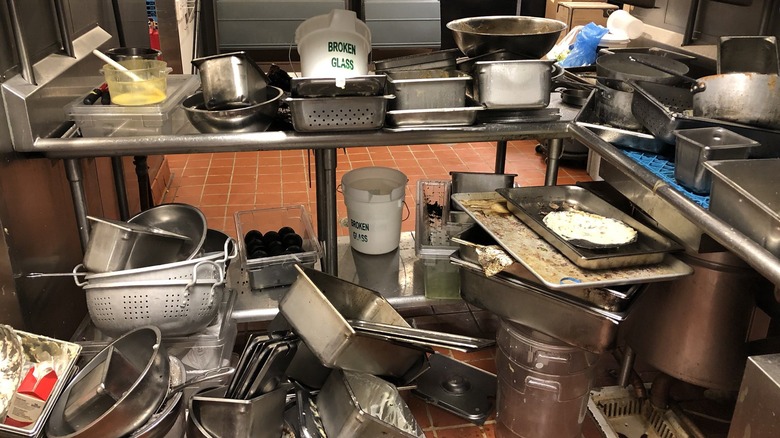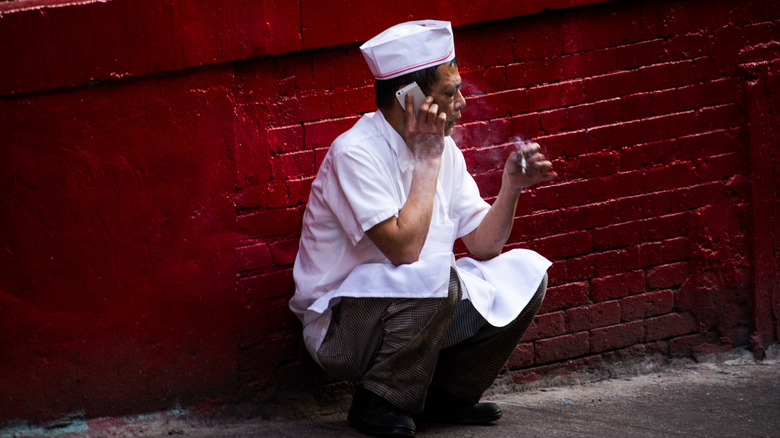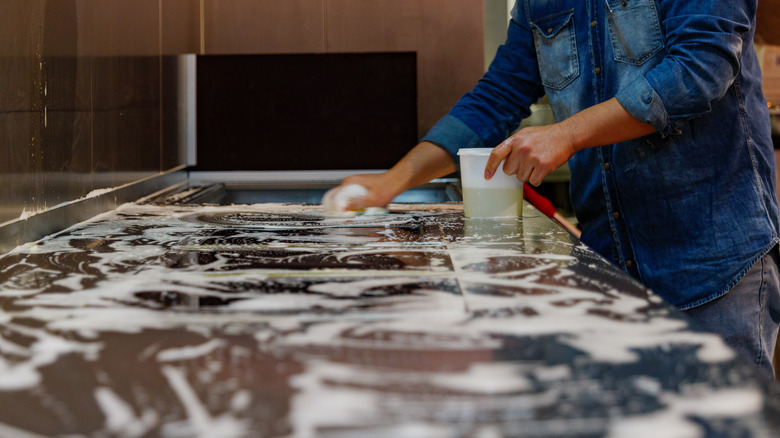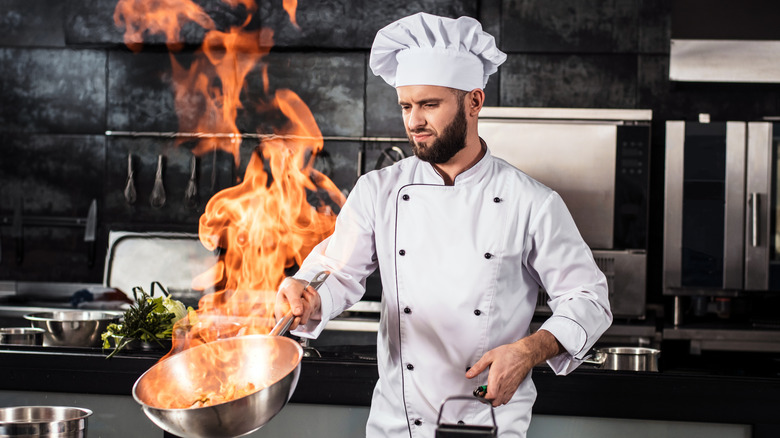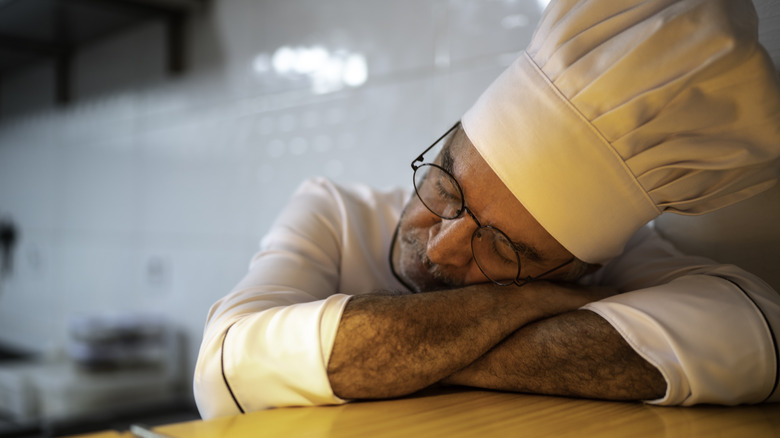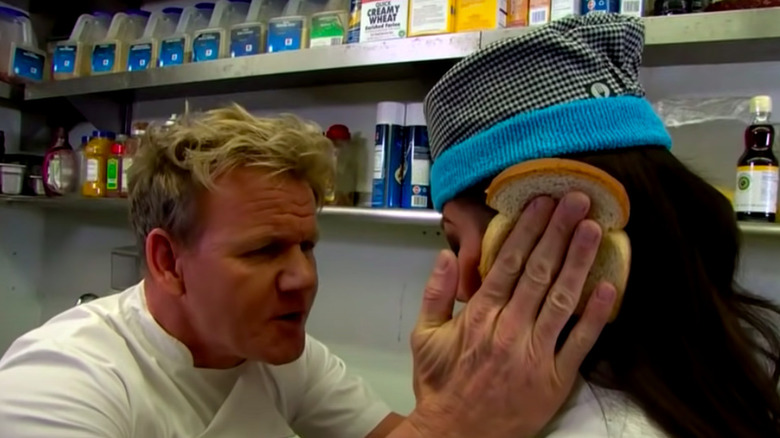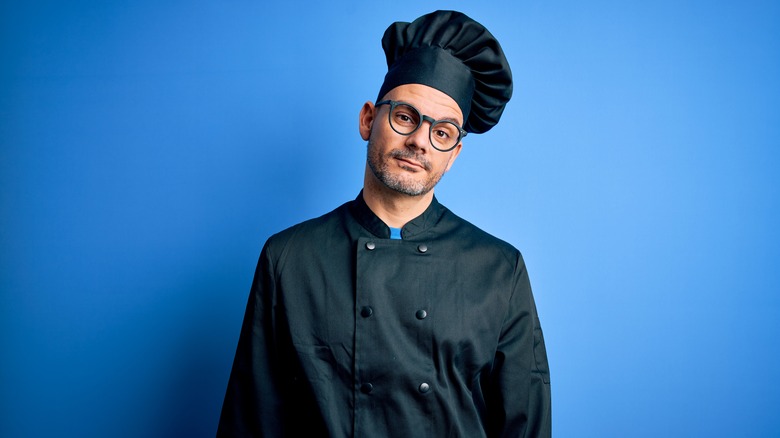12 Reasons Why Chefs Are Leaving The Kitchen For Good
A majority of chefs are overworked and underpaid, but so are a lot of people. America is built on squeezing every drop out of its labor force and ensuring that the value they provide is greater than the value they receive; that's just "Das Kapital" 101. There's something else that's spurning the current "chefxodus."
For more on that, we turn to Gillian Welch — not a chef, but a songwriter who wrote a pivotal anthem about the labors of love called "Everything is Free Now." In her song, Welch muses, "Someone hit the big score, they figured it out, that we're going to do it anyway, even if it doesn't pay." Welch wasn't singing about cooking, but her lyrics represent an entire genre of working-class people studying their trade out of love. And just like an aspiring musician, many great chefs are in kitchens because they love the craft. Unfortunately, the industry figured it out and, with that realization, understood they could push, prod, and poke chefs like pork shoulders in the name of the bottom line.
The former CEO of Chipotle said the quiet part out loud at a recent conference, asking, "Should we be so surprised [that people are quitting] when mostly what we're trying to do is manipulate them?" There are so many agonizing details in the day-to-day lives of chefs that eventually, many chefs face two paths: burnout or burn victim.
1. Sunday Brunch
Anthony Bourdain hated brunch. He wrote in The New Yorker that "The 'B' word is dreaded by all dedicated cooks." And he was absolutely right.
Sundays are for sleeping in, skipping out on your routine, and watching TV. Unless you're working in the service industry; in that case, Sundays are for getting to the office before sunrise, stirring around a big ol' pot of vinegar, and hoping that poached egg comes out to the customer's liking.
For the people making it, Sunday brunch is hell on Earth. Having to cook breakfast and lunch options already creates twice the prep work and mental capacity for the same service, and brunch-goers typically come in larger groups than dinner services. Every extra person at the table is another dish that has to get out piping hot along with what the rest of the table ordered.
The communication and focus required to get large, scattered orders sent out at once does not feel easy like Sunday morning. One ticket can have the grill juggling bacon, pancakes, and burgers on the same flat top while another cook frantically shreds potatoes and, all of a sudden, a spillage incident renders the pick-up counter drenched in maple syrup. Imagine if your job was twice as hard on the most mellowed-out morning of the week. It takes a solid state of mind to get through a hectic brunch shift without considering changing careers for a moment or two in the walk-in.
2. Calling in sick is shamed
Kitchens often spin reality until everyone believes they have to show up, even if they're having trouble standing. A big reason why chefs never call out is because few restaurants provide paid sick days, but it goes beyond the dollars and cents. Chefs are almost expected to take pride in never missing a day, no matter the costs. While working in the kitchen is far from the only profession plagued by the macho notion that working sick makes you hardcore, the fact that chefs come in close contact with fresh food should change the protocols more than it does in reality.
It's one thing to work through a hangover. If it's a self-inflicted style of sickness, you take an Excedrin, sneak in through the back door 15 minutes late in sunglasses and a beanie, and hope that you can sleepwalk through the shift prepping. But there are other kinds of sicknesses out there: runny noses, throbbing headaches, and occasional coughs that chefs and other customer-facing employees feel they must work through or let the whole team down.
3. Getting called in on your day off
People might hate calling in sick because they know it's their crewmates who will suffer. It's an amazing trick performed by top brass — making sure that any absences are felt more by the rest of the kitchen than the restaurant's bottom line. If someone calls in sick, restaurants don't reduce the number of orders for the evening. Instead, the shift manager gets out their phone and sees who picks up. The show must go on, and there are no understudies eager to step up.
Every chef has put in a long, hard Saturday night shift only to be asked to come in the next morning to cover for someone or been halfway through making plans for a beautiful sunny afternoon before getting the dreaded text from your boss. It's not uncommon to get a buzz going just to have a legitimate excuse to not come in on your day off. Chefs put up with a lot of verbal abuse, but a boss being too pushy about forcing you to work on your off day can feel like the straw that finally breaks the camel's back.
4. You start off in the dish pit
Lots of chef careers drown before they really set sail amidst a backdrop of burnt pots and dirty water. Many chefs' first look at a real kitchen is through the eyes of the dish pit. Here, you'll spend your shifts scrubbing pots and pans and sticking your hands in the muck while making less money than everyone else. Dishwashers walk out of the kitchen in droves, and no one can blame them.
The worst thing about working as a dishwasher is everything. You show up and are often greeted with an overflowing pile of dirty dishes from the morning prep. Depending on your scheduling, you could have your hands in dirty dishes for 12 straight steaming hours. At the end of the night, dishwashers scrub every single plate, fork, spoon, pot, pan, and greasy part in the place before they can even start turning down their own station.
By that point, your shoes are soaked, your shirt is translucent, and your fingers are the consistency of post-ripe prunes. The rest of the kitchen is out front, having a smoke, drinking a beer, and yelling at you to hurry up so they can lock up and get to the bar. Robots should never replace human creativity, but no one would put up a fight if we taught them to wash the dishes.
5. No set hours
There is no guaranteed clock-out time in the kitchen. Breakfast shifts must finish the prep, and dinner shifts have to get the kitchen ready to do it all again tomorrow. It's one of the main reasons why when chefs are asked to give advice to aspiring chefs, they say, "Don't." And no, things won't get easier.
Those who have seen the mountaintop realize that there's nothing up there but longer hours and no overtime. There is a common conception in the working world that once you make your way up the ladder long enough, your life gets a bit easier. But in the kitchen, if you finally make it to sous or take on a salaried position, it's all over.
The chefs in charge are often the first ones in the door and the last ones out, working 12 hours a day, six days a week, and sometimes that still isn't good enough. Restaurant owners will openly tell recruiters that they don't want a chef who shows up only five days a week. In a perfect world, they'd be getting paid for the extra hours they put in, but the kitchen is no utopia. By the time some sous chefs add up all the extra hours they put in, they make less per hour than a line cook.
So, aspiring chefs can do the math. After a few years of culinary school, a month learning the ropes from the dish pit, a season on the line, and years apprenticing, what's your reward? A salaried wage and 70 hours a week in the kitchen.
6. Closing down the kitchen
Have you ever wondered why you get the feeling restaurant workers hate it when you come in 10 minutes before close? It's because they do.
Each night, chefs should be deep cleaning the flat top and fryer, in addition to every surface, floorboard, and corner of the kitchen. Cleaning a fryer involves draining gallons of hot oil into a large pot, transporting said pot to an undisclosed location, and coming back to scrub down the greasy fry-pot. Most of the grease ends up on the floor, where another eight-step cleaning process waits.
Chefs will often shut things off early, hopeful things will cool off enough to clean as soon as service is over, but just one side of french fries pushes everything back.
A splash of oil from a fryer, even one that's been off for 20 minutes, can permanently disfigure your face. Chefs push the limits of what temperature is safe all the time, deciding that the dream of being out of the restaurant before 1 a.m. is worth the very real risk of burning your hands. Cleaning the flat top can be kind of like playing Operation, but instead of a buzz, you get a third-degree burn if your timing is off.
In the back of your head while you scrub is the little voice that says, "We're going to do it all again tomorrow." There's only one way to get out of cleaning — quitting.
7. The physical toll
Working in a kitchen is hard on your body. You're on your feet all day, bouncing between the prep counter, fryer, and pass (that's the counter between the kitchen and the front of the restaurant) until you log 20K steps without ever leaving the room. On busy shifts, you might eat standing up with no break from the start of the dinner rush through close. Chefs spend their days standing, lifting awkwardly, and cranking up their body's stress levels to deliver.
And beyond the usual wear and tear of manual labor, it's impossible to work in a kitchen without getting burned. Oil splashes, pizza ovens, grabbing a handle you thought was cold but came straight from the oven, toxic cleaning supplies, sharp knives, broken glassware, and smashing into your sous coming around the corner wielding a hot pot of soup are day-to-day working hazards.
Chefs are accustomed to wearing their mutilations like badges of honor, remembering fondly sharp knives slicing through fingernails and bragging about bleeding their way through their shifts. Eventually, enough is enough. Sure, there are a lot of physically demanding jobs out there, but there's an extra weight on the back of the mind of most chefs ... they've got no safety net behind them in the form of paid time off or health insurance.
8. No benefits
Restaurants staff millions of teen employees for a reason. A summer jobs don't need a 401K, but when it's time to commit to a career path, you'll ideally find one that guarantees a surprise medical expense won't bury you. The restaurant business cannot always make that promise. There are some pathways for full-time chefs to receive proper healthcare and benefits through their employers and there's a growing trend of restaurants finding ways to help their employees, but this industry is still clearly lagging behind.
When Giant, an independent restaurant in Chicago, talked about plans to provide employee healthcare, owner Jason Vincent told Eater Chicago, "People thought we were insane." In Toast, Inc.'s 2019 restaurant success report, only 31% of responding restaurant owners reported offering insurance, and just a staggering 14% reported providing paid family leave. You'd have a tough time convincing most people that being a chef is harder than being a garbage collector, and yet people are leaving the restaurant business in greater numbers than any other profession. At least garbage collectors are typically offered a retirement plan.
As things stand now, Gordon Ramsay's tongue is better insured than most small-town line cooks and chefs. The industry feeds off of a constant turnover and justifies its lack of support by saying things like, "It's supposed to be your first job, not your career." That may be true for hosts and busboys, but restaurants need consistency from their chefs, and those chefs need consistency in return.
9. Holidays are the worst days
Holidays are extremely hard on the service industry. While your friends jump for joy for an upcoming Monday off, you know you will be working twice as hard. If you thought a regular brunch shift was bad, wait for the special menu for Mother's Day. Chefs quickly start to sound like the Grinch, feeling immense anger at what are supposed to be happy occasions.
Making matters worse is that all your customers are out with the whole family and in a good mood, which means more desserts and whack-a-doo appetizers. It's great for the restaurant owner, but back in the kitchen, all chefs can do is laugh as they toil through the irony of a Labor Day double.
Some countries mandate anyone working a holiday to receive time and a half, which helps lessen the blow of missing the BBQ. But in the land of the free, no such law exists. If they're lucky, chefs, servers, and service industry soldiers get a special meal or an extra beer at the end of the night after spending New Year's Eve sweating and serving.
10. Split shifts
A split shift is a cheeky way schedule makers can get around paying overtime: Instead of a regular 10 a.m. to 10 p.m. grind, split shifts slate chefs for the bustling lunch and dinner rushes with a break in the middle, something like from 11 a.m. to 2 p.m. and then 5 a.m. to 11 p.m. A split shift sounds good on paper and can be great for certain employees. A single parent can leave work to pick up the kids or make sure the dog doesn't spend the day peeing on the carpet. But the bad far outweighs the good.
Imagine hustling home, racing against the clock to shower, grab some shuteye, donning your uniform again, and diving back into traffic for the second commute of the day. You can always be optimistic about your split shift, but you'll likely just end up sleeping in your car or desperately warding off the temptation to start happy hour before crawling back to clock in.
A mid-work nap might not sound so bad, but split shifts are sometimes used as a way to get chefs to work an extra day each week. Five 12-hour days is a full work week plus several hours of overtime. Five seven-hour days means you can work eight hours on the sixth day. You're shortchanged on a full day's pay, your entire day's rhythm is thrown off balance, and you're expected to pull an extra shift during the week. It's a recipe for the feeling of a never-ending workweek.
11. Toxic enviornments
Everyone finds Gordon Ramsay charming when he's berating a chef on TV, but it's probably less endearing to think about how that exact same behavior is plaguing many restaurants worldwide. In fact, many chefs might tell you that Ramsay's worst TV blowups are peanuts compared to what goes on the other side of saloon doors. We're talking blatant sexism, rampant misogyny, casual sexual abuse, and hot pans to your backside if you're not moving fast enough.
In a 2021 survey, 71% of female restaurant employees reported being sexually harassed, and 41% of female respondents reported being sexually harassed by someone in a management position. The restaurant industry is far from the only working environment plagued by sexism, but what makes things complicated for chefs is that restaurant kitchens often have no HR departments.
Who do you go to if your boss tells you that you're an idiot sandwich? You and your co-workers can talk it out over a few pitchers after the shift, but there is often no mediator to create meaningful change. More seriously, who do you go to if your manager touches you inappropriately? You can hope the owner is going to take it seriously, but what if it's the owner doing the abuse? You can take it or leave.
12. Drug abuse
You might think that after getting off after a tough 12-hour shift, you'd be ready to go straight to bed, but chefs typically need hours to unwind after the adrenaline rush of a busy shift: Hours and a couple of pints. Alcohol and drug abuse is pervasive and persuasive within a professional kitchen. For the most part, it's all fun and games. One of the most common ways to send a tip to the kitchen is to buy them a round of beers. There's not a whole lot else to do when you get off work at midnight besides shoot pool and drink.
It's all in good fun for the restaurant workforce that leans youthful, but anyone considering a lifetime within the industry needs a strong will to avoid spiraling in an environment where cocaine is sometimes treated like coffee. There are countless stories of chefs becoming hooked on uppers in high-end and Michelin-star kitchens. Anthony Bourdain and Gordon Ramsay have both acknowledged that the industry is powered in part by walk-in benders.
One particular damning example comes from a paper entitled "Alcohol and other drug use in Michelin-starred kitchen brigades," when an anonymous chef admitted, "You just can't carry on if you don't do drugs." If your working environment is built on stress and cocaine, you might have to choose between developing a nasty habit or leaving the kitchen for good, no matter how much passion you've got for souffles.
